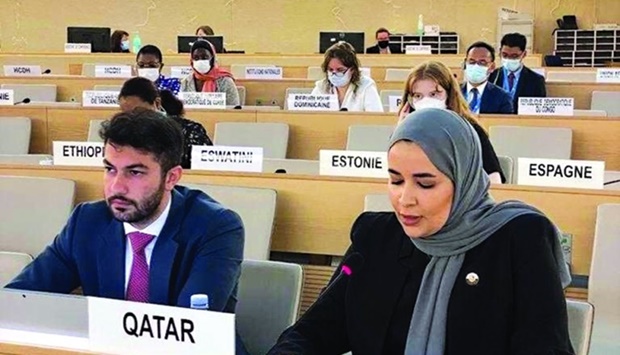It emphasised that government policies supporting Qatari women contributed to building their capabilities and providing them with full opportunities to effectively contribute to the comprehensive renaissance witnessed by the country.
This came in the statement delivered Monday by Second Secretary of the Human Rights Department at the Ministry of Foreign Affairs Hissa al-Sulaiti, at the 50th session of the Human Rights Council, during the annual thematic panel discussion on technical co-operation and capacity-building.
Al-Sulaiti said that promoting women's rights requires promoting the principle of equality and equity and raising society's awareness of the important roles and responsibilities of all its members.
She added that Qatar has adopted, in this regard, specific initiatives directed at promoting women's involvement in the labor market, in political participation, and in decision-making positions, which was positively reflected in strengthening its role as an active and essential partner in development.
Al-Sulaiti noted the initiative of the Women's Work Group recently adopted by the Ministry of Labour in Qatar with the participation of the public and private sectors and academic institutions in the country to serve as a co-operation platform for the exchange of experiences, information and best practices that ensure the presence of women at all levels and enhance their active presence, especially in the labour market.
She stressed that Qatar has adopted relevant legislation in the field of protecting women from all manifestations of violence, and has also established specialised institutions such as the Aman center, which operates under the umbrella of the Qatar Foundation for Social Work and seeks to protect and rehabilitate women and children victims of violence and family breakdown and reintegrate them into society.
This came in the statement delivered Monday by Second Secretary of the Human Rights Department at the Ministry of Foreign Affairs Hissa al-Sulaiti, at the 50th session of the Human Rights Council, during the annual thematic panel discussion on technical co-operation and capacity-building.
Al-Sulaiti said that promoting women's rights requires promoting the principle of equality and equity and raising society's awareness of the important roles and responsibilities of all its members.
She added that Qatar has adopted, in this regard, specific initiatives directed at promoting women's involvement in the labor market, in political participation, and in decision-making positions, which was positively reflected in strengthening its role as an active and essential partner in development.
Al-Sulaiti noted the initiative of the Women's Work Group recently adopted by the Ministry of Labour in Qatar with the participation of the public and private sectors and academic institutions in the country to serve as a co-operation platform for the exchange of experiences, information and best practices that ensure the presence of women at all levels and enhance their active presence, especially in the labour market.
She stressed that Qatar has adopted relevant legislation in the field of protecting women from all manifestations of violence, and has also established specialised institutions such as the Aman center, which operates under the umbrella of the Qatar Foundation for Social Work and seeks to protect and rehabilitate women and children victims of violence and family breakdown and reintegrate them into society.

